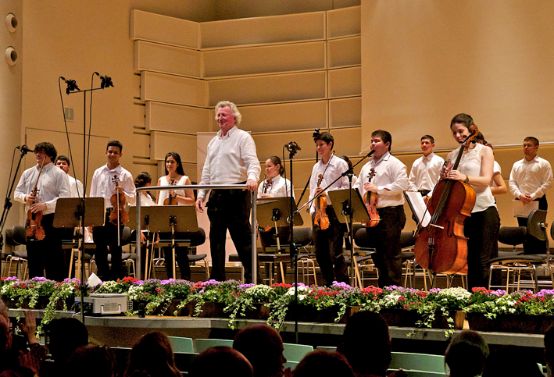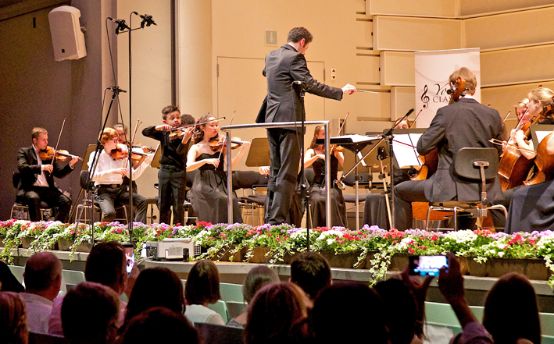When music changes lives
A joint project by Youth Classics and Sonidos de la tierra performed well-known concert pieces as well as baroque music from Paraguay and works by the Indian composer Julian Atirahu.

This time, socially disadvantaged children from Paraguay are also taking part in the benefit concert of Youth Classics, the Zurich support program for highly talented children and young people. Sonidos de la tierra (Sounds of the Earth) is the name of the initiative by composer and conductor Luis Szarán, who organizes free music education and concerts for children living in poverty in this South American country. This will also be the case on June 22 at Stadthaus Winterthur.
The idea is not new, but it works here too: Children who grow up without prospects in poverty learn to sing or play an instrument and find friends and a meaningful activity by making music together. "If you play Mozart during the day, you won't break any windows at night," says Luis Szarán, who comes from Paraguay himself. The director of the Asuncíon City Symphonic Orchestra is also active as a music researcher; indigenous Paraguayan music is very important to him.
Community makes you strong
With Sonidos de la tierra, Szarán has built up a social network over the last 15 years that is second to none. There are now around 200 free music schools across the country, and over 17,000 young people have been trained here. Almost two thirds of Paraguay's 6.8 million inhabitants live in rural regions, 28 percent live in absolute poverty and have less than 1.25 US dollars a day at their disposal, according to the World Bank's definition. Elementary school is guaranteed, but any further education or support is an unaffordable luxury.
55 francs is the cost of materials and labor for a new guitar; 125 francs is needed for music teacher training. These small sums make a big difference. Sonidos de la tierra is supported by donations and by the Jesuit organization worldwide. Szarán initially organized instruments in 18 villages and hired a teacher. The parents took care of building the school and collected donations, the children became proud instrument owners, they had regular lessons and a clear goal in mind. Whether in the choir or the orchestra: the community is strong.
Now the most talented of them are in Switzerland. Remo Schällibaum, President of Youth Classics, is often in Paraguay himself and initiated this joint benefit concert in the Stadthaus Winterthur. Three young people from Paraguay will be able to take part in the Youth Classics Master Class on the music island of Rheinau. Highly talented children and young people from all over the world will be meeting here from July 17 to 27 to work under the artistic direction of Philip A. Draganov to make music, improvise and exchange ideas with the instructors.
Baroque music and indigenous culture
What the young people from Paraguay brought with them from home for the concert was a delightful program full of surprises. Under the motto "Baroque music and indigenous culture", the 21-piece orchestra played works by the Jesuit missionaries Domenico Zipoli SJ (1688-1726) and Martin Schmid SJ (1694-1772) as well as by unknown composers who worked in the "Reductions", the villages built by the Jesuits for the indigenous people.
The rhythmic precision and agility with which the young people from Paraguay played what to our ears is "traditional" baroque music was astonishing. They were joined here by a hearty and concise vocal ensemble with four female and three male voices, and there by a soft and relaxed solo flautist.
And then the change to the music of the Indian composer Julian Atirahu, who came from the Guaraní ethnic group and was educated in a Jesuit mission village in Paraguay in the 18th century: music with a shimmering sound, rhythmically vital and pulsating, skillfully arranged and played by the young people with spirited joy.
Vital and virtuoso
The harp is the national instrument in Paraguay, and 17-year-old Eva Natalia Gonzáles revealed herself to be a virtuoso with vital expressiveness. And then 14-year-old Juan Sebastían Duarte with his bandoneon: virtuoso, relaxed and with an inspiring rhythmic lightness. The spark sparked, the audience applauded heartily. And the way 63-year-old Luis Szarán, as conductor, elegantly brought the youthful spirit to bloom with sparing gestures was simply touching.
The second part of the program was performed by the Youth Classics Orchestra under the direction of Philip A. Draganov performed classical concert literature. Whether Bach, Haydn or Grieg, the soloists demonstrated their brilliant skills in selected movements. The technically tricky feats performed by eleven-year-old Swiss violinist Raphael Nussbaumer, the youngest of them all, in Wieniawski's Scherzo-Tarantella op. 16 were of a different caliber. In the final piece by Carlos Gardel (1890-1935), both youth orchestras played together - a feast for the audience too.
-

- Photo: Michel Huber
- The Youth Classics Orchestra under the direction of Philip A. Draganov on June 22 in Winterthur








